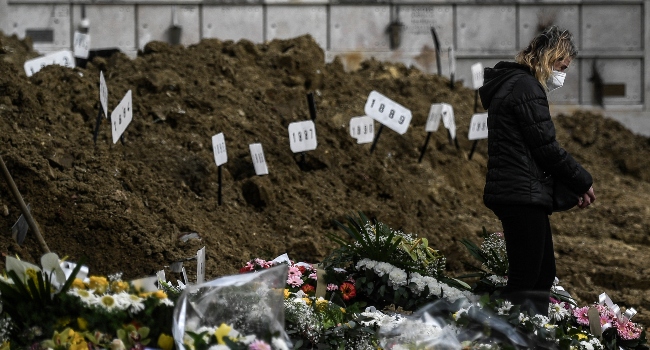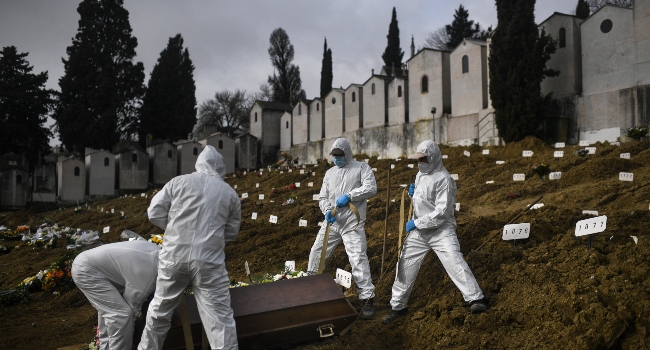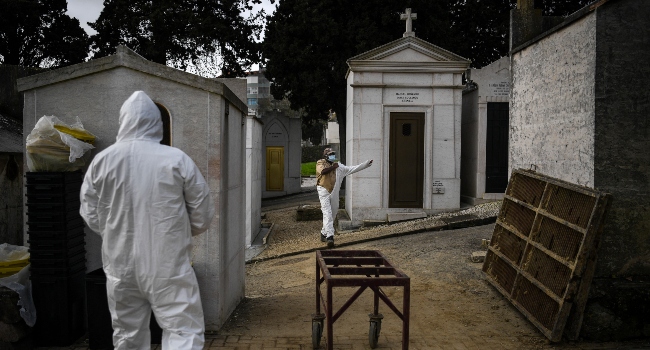COVID-19 Deaths Overwhelm Lisbon Cemetery

![]()
PATRICIA DE MELO MOREIRA / AFP
“We’re swamped” groaned Ricardo Pereira as he tamped down heavy soil between graves that have been dug non-stop near Lisbon and are quickly filled with bodies identified only by a number.
“This plot of land was filled in around 50 days whereas it would normally take almost a year,” the 36-year-old gravedigger told AFP, without letting go of his spade.
Pereira works in the Alto de Sao Joao cemetery, the capital’s biggest, which overlooks the Tagus river estuary.
His day began with the burial of two bodies sent by a social centre, and who likely died from Covid-19, according to cemetery director Fausto Caridade.
When the unaccompanied hearse arrived, four workers donned regulation personal protection clothing for Covid burials: masks, blue gloves and a one-piece white suit that covered them from head to foot.
The two coffins were buried side-by-side because there is almost no more space in this part of the cemetery where graves are marked only by a number written on a white plaque planted in the soil.

PATRICIA DE MELO MOREIRA / AFP
– ‘See the reality’ –
A central alley in the section, which opened in late December to receive Covid-19 victims, for the most part, is lined with piles of fresh flowers, and an orange backhoe loader stands by to dig more graves.
“People should come here to see the reality,” lamented Maria Joao Costa, who had buried her 80-year-old mother.
“Two weeks ago, my mother received her first vaccine dose,” she explained with difficulty while looking at a large portrait of her mother that she had brought along.
Since early January, Portugal has recorded an average of almost 180 deaths per day from the coronavirus.
When micro-states such as San Marino are excluded, Portugal is the sixth most heavily-hit country in Europe, and worldwide, in terms of deaths per population.
With a little more than 1,500 deaths per one million inhabitants, it has even overtaken the numbers recorded in the United States and neighbouring Spain.
A lockdown that began in mid-January has helped cut the number of new cases, and deaths per day have also fallen from a peak of more than 300, but cemeteries are filling up nonetheless.

PATRICIA DE MELO MOREIRA / AFP
– Historic spike in mortality –
“There are still lots of bodies in morgues that must be buried,” Pereira noted.
Of 10 burials scheduled that day in the Alto de Sao Joao cemetery, half the deaths were attributed to Covid-19.
Surrounded by white mausoleums, one of Lisbon’s three crematoriums was in constant use from morning until night.
During the month of January, an average of 12 bodies were cremated each day before the pandemic struck.
“At the moment, they are working at full capacity, with more than 20,” explained Sara Goncalves, a city authority employee who manages all of its graveyards.
The coronavirus has provoked a peak in mortality not seen since the global flu pandemic in 1920, with more than 123,000 deaths in Portugal last year.
Almost 16,000 deaths have been attributed to Covid-19, more than half of which were recorded this year.
-AFP


